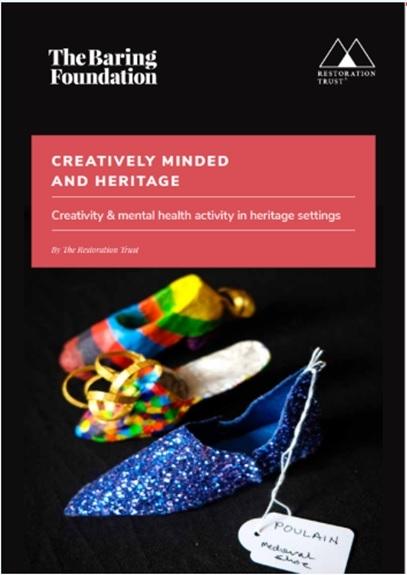New Publication on Mental Health and Heritage
Many FROG members and others who follow TDP know that we’ve been working on how foreshore archaeology can support good mental health. A report was recently published highlighting the work of TDP and others, as well as including a call to action from one of our archaeologists.
Since December 2019 our City Bridge Trust funding has included veterans and Londoners living with mental health difficulties as target audiences. Delivery of this project has been led by Will Rathouse. With three months of the project to go and in spite of the difficulties presented by the Covid-19 pandemic we have already exceeded some of our targets and are set to fulfil most of those remaining. Over 90% of the people in these groups who filled in a feedback form reported some kind of improvement in their well-being.
Back in 2019 Eliott, Helen, Will, and Josh visited the Restoration Trust at Burgh Castle in Norfolk to learn about the work they were doing there using both heritage and creative arts/crafts to support people who were experiencing mental health difficulties. This project, known as The Burgh Castle Almanac, was funded by the Baring Foundation. Recently, the Restoration Trust and the Baring Foundation published a report entitled Creatively Minded and Heritage which describes how different approaches may use creative programmes with a heritage focus or in a heritage setting to help people manage and/or overcome mental health difficulties.

The report includes contributions from several organisations and projects. One of these is a section from MOLA’s Magnus Copps who wrote about the mental health and well-being work being done by Thames Discovery Programme. He also described related work which has been undertaken by CITiZAN and MOLA’s Built Heritage Youth Engagement Project which ran from 2016 to 2019, and was funded by the Andrew Lloyd Webber Foundation. This project helped young people in the youth justice system to gain new insight into the design and history of their everyday environment.
In the report, Laura Drysdale (CEO of the Restoration Trust) points out that: “The pandemic has exposed the fragility of the mental health systems, especially if you are poor”. As well as improving mental health she explains how creative heritage projects help participants to learn and to build self-confidence.
The report includes a diverse range of voices associated with a wide variety of intriguing heritage projects which have taken place across the UK and beyond. It finishes with a manifesto for increased work in this area from our own Will Rathouse and a view from Desi Gradinarova of Historic England. Will is particularly keen to encourage a longer-term approach to funding and to ensure that mental health and well-being projects are conducted safely.
If you’re interest in the mental health and well-being aspect of community archaeology we heartily recommend downloading the Creatively Minded and Heritage report.